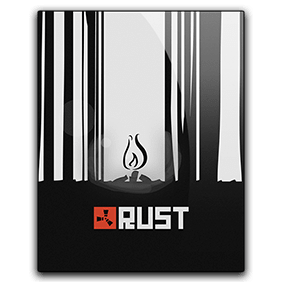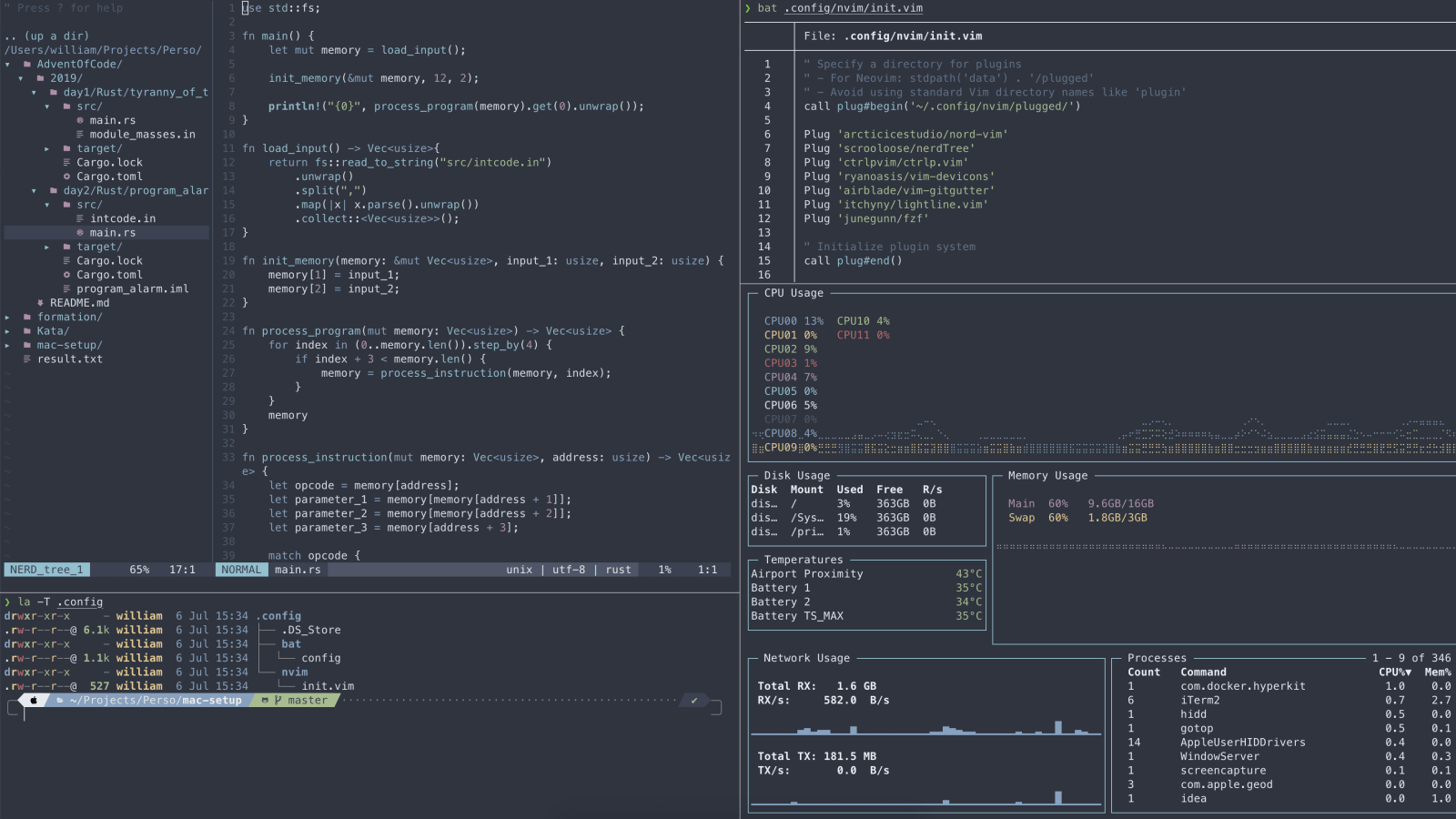Rusty Mac OS
Rust is a systems programming language focused on speed and safe concurrency, and which I’ve been using for personal projects heavily since the 1.0 release last year. Most of these projects have been replacements for existing scripts in my workflows or new command line tools, but I wanted to create a Mac application and determine if it would benefit from Rust’s memory efficiency, safety, and robust library ecosystem.
I’ve done iOS and Mac application development for many years and it's worth noting that the hardest part of Cocoa development has always been learning the frameworks rather than the languages. This experiment is about applying Cocoa and Rust knowledge to create something safe and yet easy to work with.
Getting started with Cocoa crates
There are already crates for working with the Objective-C runtime, such as the [CODE]objc[/CODE] and [CODE]block[/CODE] crates, which are for using the runtime directly and interfacing with Apple’s block extensions respectively. The [CODE]objc[/CODE] crate in particular provides the [CODE]msg_send![/CODE] macro, which is a basic interface to messaging Objective-C objects. Here’s an example of creating an [CODE]NSObject[/CODE]:
-- CODE language-rust --
unsafe {
let cls = Class::get('NSObject').unwrap();
let obj: *mut Object = msg_send![cls, new];
}
SampleScience releases free Rusty Piano plugin for Windows and macOS. Rekkerd.org. 39m. SampleScience has announced the release of a fully multi-sampled acoustic piano recorded hot for a warm, softly saturated sound. The Rusty Piano. The only aim in Rust is to survive. To do this you will need to overcome struggles such as hunger, thirst and cold. Build a shelter. Kill animals for meat. Protect yourself from other players, and kill them for meat. Create alliances with other players and form a town. Do whatever it takes to survive.
The [CODE]cocoa[/CODE] crate builds on this to provide an interface to using frameworks including AppKit for drawing windows and views onscreen. It also has an interesting take on implementing Objective-C classes in that translates them to traits which are implemented by a generic [CODE]NSObject[/CODE] type. This snippet creates an app and a window, and presents it on screen:
-- CODE language-rust --
unsafe {
let _pool = NSAutoreleasePool::new(nil);
let app = NSApp();
app.setActivationPolicy_(NSApplicationActivationPolicyRegular);
let window = NSWindow::alloc(nil).initWithContentRect_styleMask_backing_defer_(
NSRect::new(NSPoint::new(0., 0.), NSSize::new(200., 200.)),
NSTitledWindowMask as NSUInteger,
NSBackingStoreBuffered,
NO
).autorelease();
let title = NSString::alloc(nil).init_str('Hello World!');
window.setTitle_(title);
window.makeKeyAndOrderFront_(nil);
app.run();
}
Pretty cool, though as is, the entire interface is unsafe, missing the hopeful goal of the experiment. This approach could still be interesting when writing the application core code in Rust, and then packaging it using Cocoa bindings.
Wrapping Cocoa APIs in “safety”
Given those caveats, couldn’t we create Rust wrappers for Objective-C classes? Of course! After some trial and error, I had a base trait to use for wrapping and interacting with Objective-C objects:
-- CODE language-rust --
use objc::runtime::Object;
pub type Id = *mut Object;
pub trait ObjCClass: Sized {
/// Returns pointer to underlying objc object
fn ptr(&self) -> Id;
/// Creates an instance from an objc object pointer, failing
/// if the pointer is not an instance of the wrapped class
fn from_ptr(ptr: Id) -> Option<self>;</self>
/// The printed name of the class
fn class_name() -> &'static str;
/// Type-safe reference to an instance with a nil pointer
fn nil() -> Self;
/// Performs an `isKindOfClass` check to whether a particular
/// pointer is an instance of the wrapped class
fn ptr_is_class(ptr: Id) -> bool;
/// Change an instance of one class into another, failing if
/// the pointer is not an instance of the preferred class.
/// Useful for converting between inherited classes e.g.
/// NSDictionary to NSMutableDictionary.
fn coerce<t: objcclass='>(&self) -> Option<t> {</t></t:>
T::from_ptr(self.ptr())
}
/// Designate this instance as suitable for being released
/// once it is out of scope
fn autorelease(&self) -> Self;
/// Drop the Objective-C reference. The object is then invalid
fn release(&mut self);
}
Note that this creates a Rust object with a reference to an Objective-C object, but the overall effect is minimal as most interaction still happens in Objective-C runtime land.
Using this trait was most easily done creating a handy macro named [CODE]impl_objc_class[/CODE], and then wrapping the average class became easy! Here’s an example which wraps a few methods on [CODE]NSString[/CODE].

-- CODE language-rust --
const UTF8_ENCODING: NSUInteger = 4;
impl_objc_class!(NSString);
impl NSString {
/// Creates an `NSString` from a `str`.
pub fn from(content: &str) -> Self {
let ptr: *mut Object = unsafe {
let string: *mut Object = msg_send![class!('NSString'), alloc];
msg_send![string, initWithBytes:content.as_ptr()
length:content.len()
encoding:UTF8_ENCODING]
};
NSString { ptr: ptr }
}
/// The length of the string as measured in UTF-8 code points
pub fn len(&self) -> usize {
unsafe { msg_send![self.ptr, lengthOfBytesUsingEncoding:UTF8_ENCODING] }
}
}
The class can now be used directly, and without [CODE]unsafe[/CODE]:
-- CODE language-rust --
let greeting = NSString::from('hello');
assert_eq!(greeting.len(), 5);
Resources still need to be released (or auto-released, if applicable) when they are no longer needed, but classes became much easier to use. I explored some options such as implementing a [CODE]Drop[/CODE] trait to automatically discard Objective-C objects once the Rust reference goes out of scope, but this behavior is not always desirable, especially when working with references to applications and windows which are expected to stay for the life time of the application, or at least longer than the current scope.
Packaging Rust into an app
While we can use the snippets of the cocoa crate to run an executable, the executable is not packaged as an app bundle, which would be suitable for having an app icon, putting an app in the dock, or being registered as a default application (like being the mail client used for [CODE]mailto:[/CODE] links, for example). For that, we’d need to package the executable into an app bundle.
An easy way to create an app bundle which launches Rust code is to create a Cocoa app with a Rust and dependent app target. This requires a few steps in Xcode:
- Create a new app using the Cocoa app template
- Add a second “External build system” target to the application which creates the Rust binary
- Add the second target to the default app target as a dependency
- Add the rust executable as a bundled resource of the app target
- Replace the default AppDelegate with a script to launch the Rust binary, something like this bit of Swift:
-- CODE language-rust --
let task = Process()
task.launchPath = Bundle.main.path(forResource: 'my-rust-program', ofType: nil)
task.launch()
task.waitUntilExit()
I’ve created an example which shows all of these parts in action, adds an app icon, and pipes output from the Rust executable to the system console.
Conclusions
The initial results were less than ergonomic when using the existing Cocoa crate since the interface did not add additional safety, and perhaps removed some because the generic object type conformed to every Cocoa class trait. I could (and did) call the wrong methods on Cocoa class instances.
Rusty Mac Os Download
Writing my own layer of classes on top of [CODE]objc[/CODE] improved the latter, though it was more initial overhead to write wrappers before using classes, and still felt clumsy when converting between values in class clusters for example. There is potential for a “Rustier” crate for interfacing with Objective-C, or a generator which makes ergonomic method names. Despite this, I mapped a number of Objective-C classes by hand, and while my stylistic choices probably aren’t suitable for a general use library, Rust+Cocoa became very fast to use and iterate on ideas. The approach could be worth a try if you have reusable components in Rust to share with a Cocoa application, and have constructs unsuitable for use with the foreign function interface.
There’s more I could cover here about the experience, like how to declare your own Objective-C classes in Rust and implementing protocols, but that should be the topic of a later post.
I’ve made some longer examples demonstrating the snippets in this post as well as a general template usable for packaging a mac app, which is available on GitHub.
Thanks for reading!
Getting started
If you're just getting started withRust and would like a more detailed walk-through, see ourgetting started page.
Windows considerations
On Windows, Rust additionally requires the C++ build tools for Visual Studio 2013 or later. The easiest way to acquire the build tools is by installing Microsoft Visual C++ Build Tools 2019 which provides just the Visual C++ build tools. Alternately, you can install Visual Studio 2019, Visual Studio 2017, Visual Studio 2015, or Visual Studio 2013 and during install select the “C++ tools.”
For further information about configuring Rust on Windows see the Windows-specific rustup documentation.

Toolchain management with rustup
Rust Mac Os
Rust is installed and managed by the rustup tool. Rust has a 6-week rapid release process and supports a great number of platforms, so there are many builds of Rust available at any time. rustup manages these builds in a consistent way on every platform that Rust supports, enabling installation of Rust from the beta and nightly release channels as well as support for additional cross-compilation targets.
If you've installed rustup in the past, you can update your installation by running rustup update.
For more information see the rustup documentation.
Configuring the PATH environmentvariable
In the Rust development environment, all tools are installed to the ~/.cargo/bin%USERPROFILE%.cargobin directory, and this is where you will find the Rust toolchain, including rustc, cargo, and rustup.
Accordingly, it is customary for Rust developers to include this directory in their PATH environment variable. During installation rustup will attempt to configure the PATH. Because of differences between platforms, command shells, and bugs in rustup, the modifications to PATH may not take effect until the console is restarted, or the user is logged out, or it may not succeed at all.
Rust Macos Metal
If, after installation, running rustc --version in the console fails, this is the most likely reason.
Rusty Mac Os 11
Uninstall Rust
If at any point you would like to uninstall Rust, you can run rustup self uninstall. We'll miss you though!